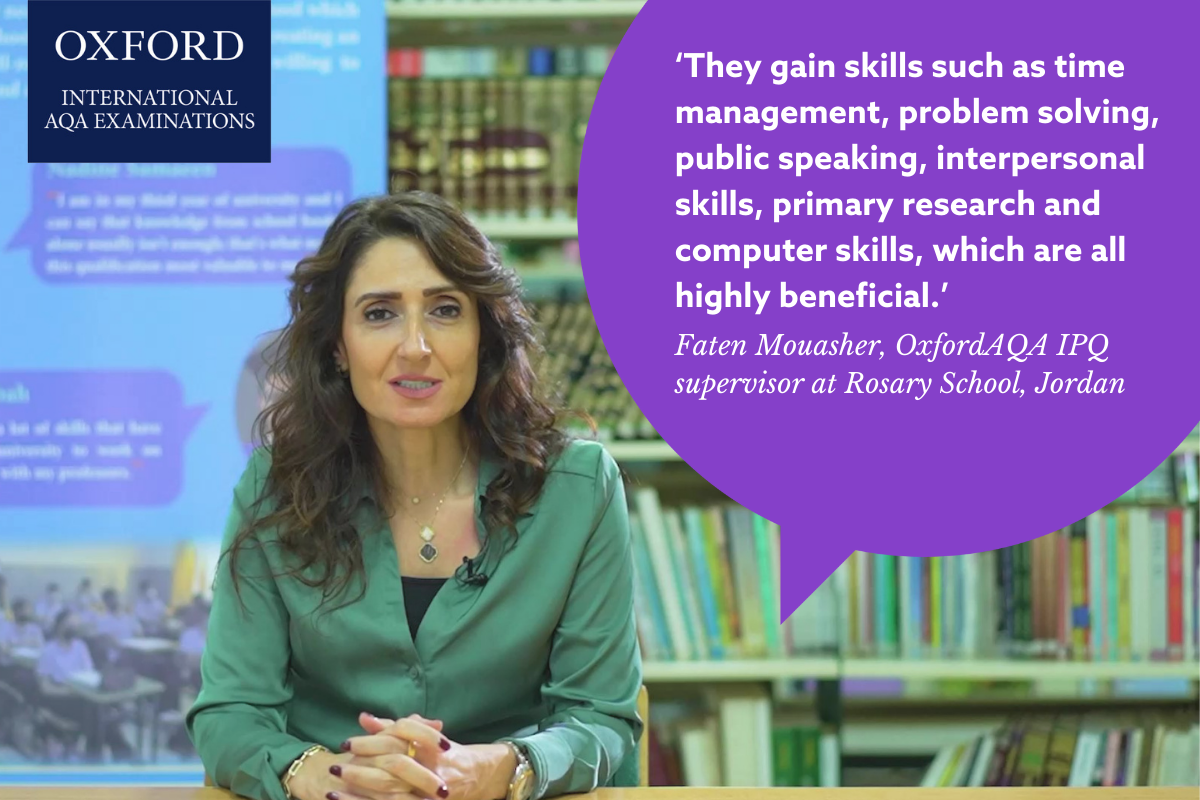Teachers have unquestionably been one of the heroes of the pandemic. When schools across the world closed their doors, teachers had to adapt to a completely different way of working, almost overnight. Now that those doors have re-opened, the challenge has shifted to mitigating the impact of lost learning and empowering students to reach their full potential.
During lockdown, Rosary School in Jordan found that students undertaking the OxfordAQA Independent Project Qualification (IPQ) were better equipped to handle the level of independence required for remote teaching and learning. When the school returned to face-to-face lessons, teachers found that the same qualification was perfect for helping students transition back into full-time study and offset the impact of the pandemic.
‘It is essential for students to find and explore an area of their interest to broaden their minds,’ says Faten Mouasher, IPQ Supervisor at Rosary School, when explaining why her school implemented an IPQ programme. ‘They gain skills such as time management, problem solving, public speaking, interpersonal skills, primary research and computer skills, which are all highly beneficial.’
It was these skills that enabled students to thrive on their return to the classroom. Extensive research has demonstrated that students taking an extended project qualification are more likely to be successful in their other A-levels, as the skills they acquire cross-pollinate across all their studies, and this was certainly the case for Rosary School. Students on the initial IPQ programme exceeded their expected A-level results, including three who are now studying medicine, either at the University of Jordan or overseas.
Developing student skills
The students themselves are very clear that the IPQ was a significant factor in their success, with one saying how instrumental it was in preparing him for medical school: ‘Throughout my IPQ project, I learned about neurology and the working of the brain…I gained knowledge which helped reassure my decision to pursue medicine at university.’
For others, it was less about the subject-specific insights and more about the skills and confidence they gained from the process of completing an IPQ. ‘I have now gained the skill of managing my time more efficiently,’ says one student, ‘setting proper amounts of time for each task that I must complete.’ Another commented on how their ‘problem solving skills greatly improved…I could face any issue that might come up.’
For one student, delivering the oral presentation was the achievement that stayed with them: ‘One major insecurity of mine was public speaking. I admit I was a bit hesitant when I heard I had to do a 10-minute presentation. Fortunately, I was able to complete it without any notes and now I can easily prepare and deliver presentations.’
Staff at Rosary School were so impressed by the impact of IPQ on their students, both in terms of the academic outcomes and the range of soft and hard skills it equipped them with, that the school has now rolled out IPQ as a mandatory AS subject for all students. ‘We are fully determined to go on with the IPQ,’ says Faten Mouasher. ‘We understand the importance of such a qualification for our students. It will with no doubt help them in their future studies.’
About the OxfordAQA Independent Project Qualification
In 2008, an independent review into the UK education system recognised that students needed to improve their independence and critical analysis skills. Out of this review came the Extended Project Qualification (EPQ), a student-led project qualification that would sit alongside traditional A-levels, giving students the opportunity to explore a topic of interest in greater depth, gain vital research and critical analysis skills, and understand how to work independently. It proved incredibly popular, and now over 30,000 UK students take an EPQ each year.
OxfordAQA’s Independent Project Qualification (IPQ) is the first IPQ designed specifically for international students. Based on AQA’s Extended Project Qualification, the leading EPQ in the UK, it is popular with schools across the globe.
OxfordAQA also has a GCSE student-led project option. GCSE Plus is an endorsement that can be attached to any OxfordAQA International GCSE (except English Language), and embeds the same skills as the IPQ, but at a level appropriate for younger students. Many schools have found it a useful tool for helping students improve their study skills following the pandemic, as well as preparing them for the transition from GCSE to A-level.
If you would like to know more about the benefits of OxfordAQA IPQ and GCSE Plus, visit the student-led projects section of our website.

nice content thanks for sharing about .How independent project-based qualifications can empower students affected by disrupted learning.